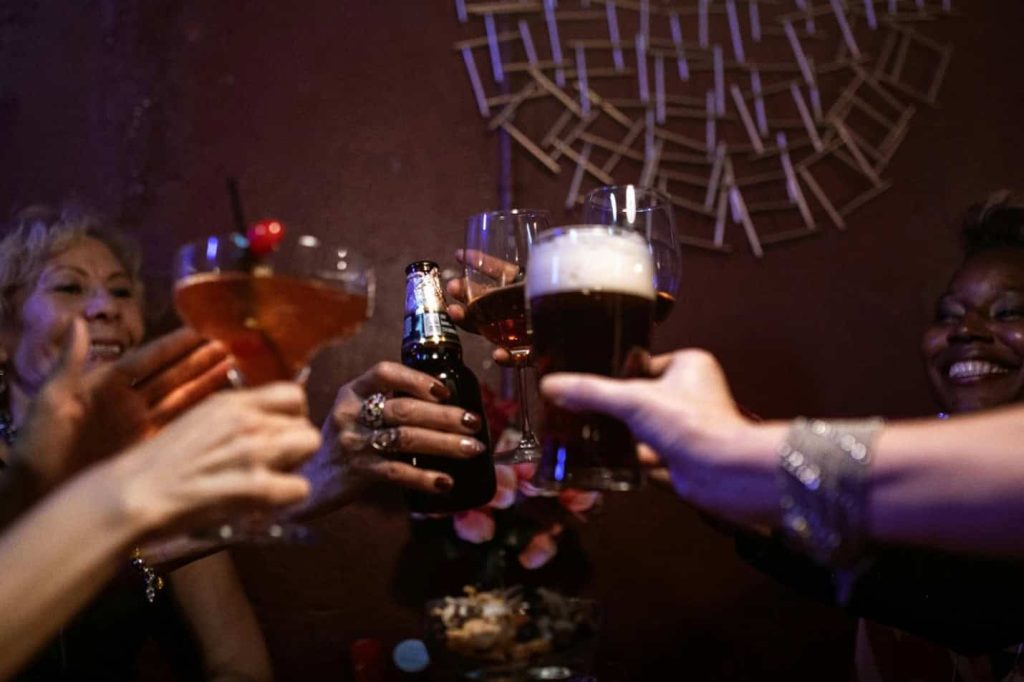Have you ever been to a party, where the music’s pumping, the dance floor’s hot, you got good company and smooth booze, and bam! You wake up the next morning without remembering how and who got you home.
And now you have to play detective to piece together the jigsaw of last night’s events. Welcome to the club of alcohol-induced blackout tales!
If this is your experience, we got you covered. This article will prompt the question, “What is a blackout from alcohol?”, unraveling the complexities around alcohol blackouts, its triggers, consequences, and most importantly, how to steer clear of this mental haze.
What is a blackout from alcohol?
According to the National Institute of Health, alcohol, when consumed in large quantities over a short period, interferes with the brain’s ability to store new information long-term.
While previously established long-term memories before the indulgence are left intact, new memories experience partial or complete inconsistencies during the period of drinking.
Essentially when one is blacked out, the brain will still process new information but it is unable to form new memories. So you may look fine, move around, and interact with others but lack memory of these events.
Blackouts are, therefore, periods of memory loss experienced during alcohol indulgence. They are common among social drinkers. These memory impairments increase as more alcohol is consumed.
It is worth noting that blackouts can progress to passing out. While the two are often confused, a passed-out individual is unresponsive and inactive. Loss of consciousness is a more severe level of impairment that may suggest a possible alcohol overdose. Whereas with a blackout, the individual remains conscious and responsive.
Types of alcohol blackouts
Not all alcohol blackouts are the same. Different individuals tell of different experiences depending on the severity of the amnesia.
There are two forms of alcohol-induced blackouts:
1. En-block blackout
Also known as a complete blackout, it is a total memory loss of the events following a drinking spree. It occurs when the blood alcohol concentration (BAC) reaches 0.16 or higher. The memory loss cannot be recovered under any circumstances.
2. Fragmentary blackout
This is partial memory loss that occurs following a binge-drinking session. Fragments of memory may be remembered upon encountering certain cues associated with activities undertaken during the blackout. Fragmentary blackouts are prevalent when BAC levels are as low as 0.14 (14%).
Who is most prone to alcohol blackouts?
Blackouts can occur in individuals of any age and of any drinking experience level. The common factor is heavy alcohol consumption over a short period.
Nonetheless, reports suggest that middle-aged males struggling with alcoholism are at a higher risk of blacking out.
Researchers have also linked blackout frequencies to college drinkers. 75% of college students are active drinkers and more tend to go on a drinking spree at least once a week.
There are potential risk factors associated with the prevalence of an alcohol blackout. Read on to understand what predisposes you to a blackout from alcohol.
What causes alcohol blackouts?
Tolerance levels
Individuals with lower tolerance levels, who are potentially of lesser drinking experience, are more susceptible to blackouts when consuming larger amounts of alcohol.
Age
Studies have shown that younger drinkers, especially of adolescent age, have a lower tolerance level than their older counterparts. Their developing brains may be more vulnerable to the cognitive effects of alcohol increasing their susceptibility to blackouts.
Binge drinking
Binge drinking refers to consuming significant amounts of alcohol within a short period, that is, 5 or more drinks on a go for a man and 4 or more drinks for a woman.
This increases the risk of blackouts across different age groups and experience levels. Binge drinking overwhelms the body’s ability to process alcohol.
Usually, a blackout would last as long as your body would take to burn the alcohol in the bloodstream. Once this happens, the brain can start forming memories again.
This explains why most people recover from blackouts after sleeping, it allows the body to process the alcohol.
Signs and symptoms of an alcohol blackout
- Memory lapse:- The inability to account for or remember specific details, conversations, or activities that occurred during a period of alcohol indulgence is a clear indication of a blackout.
- Fragmented recall:- When you experience flashes of a night’s or day’s events, where some aspects are still foggy or entirely missing, then you most certainly had a blackout.
- Confusion:- Feeling confused or disoriented about what transpired during the blackout period.
- Inconsistencies in what transpired:- More often than not, your friend’s account of what transpired during the blackout period may not match your recollection, especially when experiencing memory flashes.
- Impaired coordination:- Most alcohol-induced blackouts are preceded by impaired motor skills, staggering, or slurred speech, indicating a higher level of intoxication that exceeds BAC 0.14.
- Recklessness:- Risky behaviors such as unprotected sex, driving under the influence, aggression, and violence may be a result of impaired judgment from excessive alcohol consumption. This loss of inhibitions indicates an interplay of neurobiological and psychological factors, where an individual acts in ways they typically would not.
- Emotional distress:- An individual may experience anxiety or nervousness upon the realization of memory gaps or the consequences of the actions preceding or during a blackout.
- Hangover-like symptoms:- Headaches, dizziness, or nausea after the experience may serve as a reminder of heavy alcohol consumption.
Effects of excessive drinking and alcohol blackouts
Excessive drinking, which leads to blackouts, can have a range of adverse effects on the physical, mental, and social well-being of a person.
Understanding the related consequences of alcohol-induced blackouts will help you or your loved ones make informed choices and seek medical help when needed.
Below are the effects associated with excessive drinking and alcohol-induced blackouts:
Health risks
Heavy drinking, which is consuming 8 or more drinks for a woman and 15 or more drinks for a man, can lead to irreversible liver diseases such as liver cirrhosis, alcoholic hepatitis, and fatty liver.
It is also linked to cardiovascular issues such as high blood pressure, irregular and elevated heart rate, and heart diseases. Alcohol suppresses the immune system, increasing an individual’s susceptibility to infections.
Cognitive impairment

Excessive drinking leads to impaired judgment, prompting poor decisions and risky behaviors during a blackout episode.
Increased likelihood of injuries
Blackouts increase the risk of accidents, injuries, or falls, putting your safety and those around you in jeopardy. This is as a result of impaired judgment and coordination.
Emotional and mental health issues
Excessive alcohol consumption can exacerbate pre-existing mental health disorders such as depression and anxiety.
Due to the impulsivity experienced during the blackout, an individual may portray suicidal behaviors.
Relationship strain
Frequent blackouts and erratic behavior can put a strain on one’s personal and social relationships. Friends may begin withdrawing from enjoying social activities with their counterparts who drink without limits.
An individual might also self-isolate due to the impact of alcohol on their social behavior.
Financial strain
Heavy drinking leads to a waste of finances on booze, medical fees, and legal fees. The latter is often due to the legal consequences of driving under the influence, accruing legal fines, license suspension, and potential imprisonment.
Loss of employment
As one indulges more in alcohol, their lifestyle may affect their job performance and jeopardize their employment.
Dependence and addiction
Regular heavy drinking creates alcohol dependency which, if left untreated, may develop into addiction.
Reduced life expectancy
As one experiences subsequent blackouts from alcohol indulgence, they reduce their quality of life by predisposing their bodies to health issues. This ultimately reduces their life expectancy.
How to prevent alcohol blackouts
Stay hydrated
Alcohol is a diuretic, meaning it increases urine production which can contribute to dehydration. Overindulgence can exacerbate this dehydration, causing headaches, fatigue, and discomfort. It is, therefore, recommended to alternate alcohol with water to slow down its absorption into the bloodstream, reducing the risk of a blackout.
Proper nutrition
Taking a meal before drinking also slows down the rate of alcohol absorption into the bloodstream. The food in the stomach acts as a buffer, reducing the impact of alcohol on the body.
Drink responsibly
Responsible drinking involves setting a predetermined limit on the number of drinks your body can handle without losing cognitive function. Avoid binge drinking at all costs and space out your drinks with water instead.
This will ensure you not only pace yourself but also drink moderately to reduce the risk of a blackout. It is also indicative that you understand your tolerance levels.
Avoid mixing alcohol with other substances
Mixing alcohol with medication or other drugs can lead to the multiplier effect, a condition that can have dangerous health consequences and total blackouts. In case you’re taking any medications, it is imperative to know their potential interactions with alcohol before drinking as some can amplify the effects of alcohol.
Choose lower alcohol content beverages
Some drinks such as distilled spirits (rum, gin, whiskey, vodka) have a higher alcohol by volume (ABV) content than beers and wine. Therefore, more alcohol will be absorbed into the bloodstream increasing the risk of blackouts.
Lower ABV beverages reduce the overall alcohol intake during a drinking session.
Take away
Overall, being mindful of your alcohol intake can contribute to a safer and healthier drinking experience. Now that we’ve demystified alcohol blackouts and understood the science behind the question “What is a blackout from alcohol?”, you can make informed and safer choices.
However, it is worth noting that while blackouts may seem like a temporary lapse in memory, they may indicate potential risks to bigger physical and mental complications. If your frequent blackouts or alcohol consumption have raised an issue of concern, it is advisable to seek guidance from a healthcare professional promptly.


